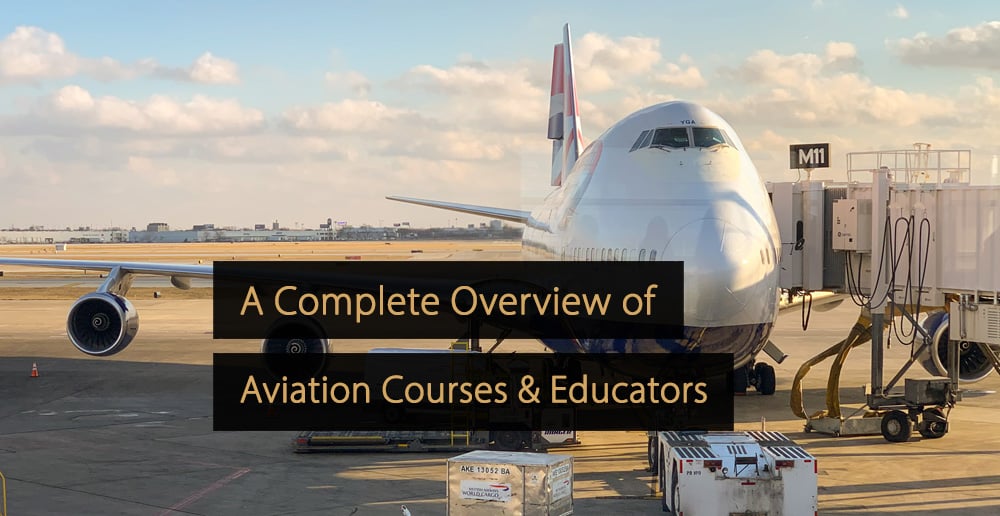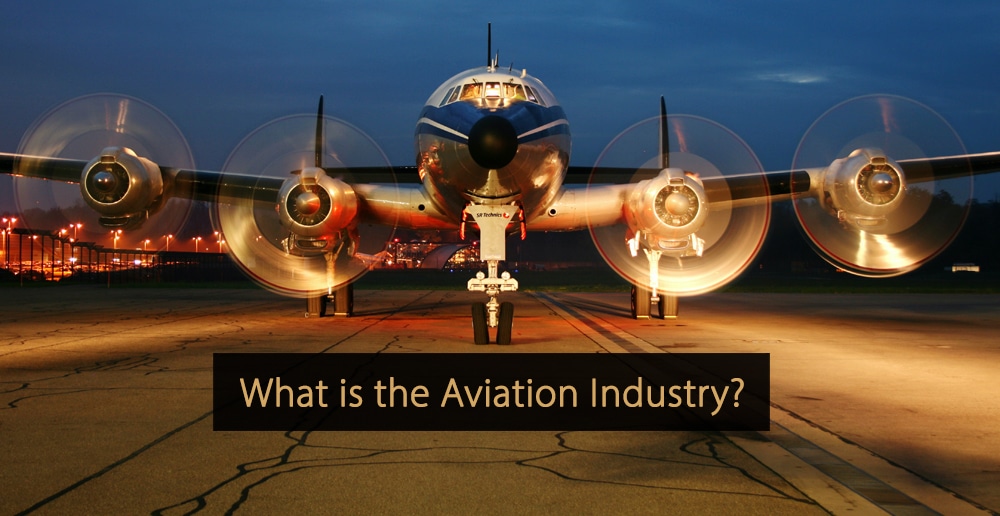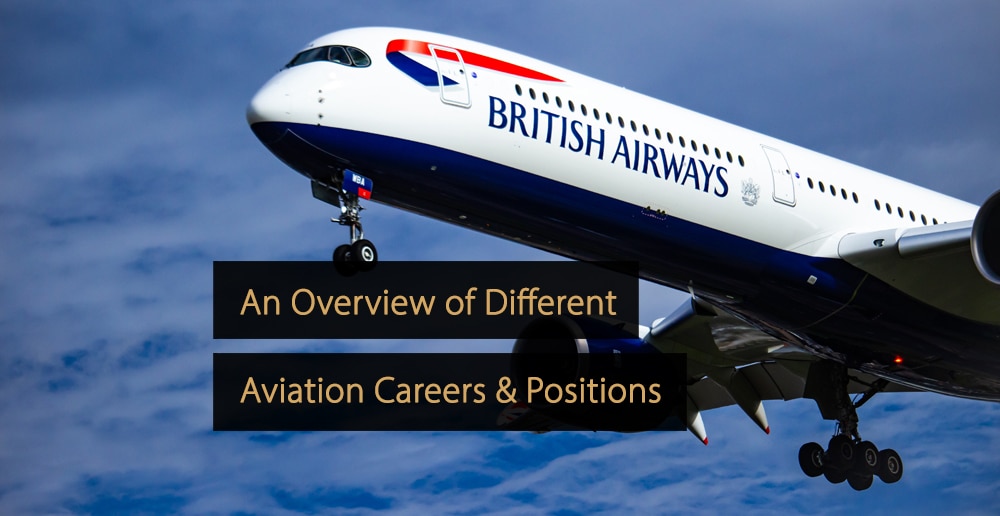Many academic institutions and other educators offer aviation courses, which can help you with the relevant skills and knowledge required to succeed in the industry. This article gives you access to a list of the various options available, along with information on where to find these courses.
Table of Contents:
- What is the Meaning of Aviation?
- Aviation Management Explained
- Interested in an Aviation Course? What Skills Do You Need in Aviation?
- What is the Duration of an Aviation Course?
- Aviation Courses: Examples of Different Types & Topics
- Websites to Search for Aviation Courses
- List of Educators Who Offer Aviation Courses
- Tips to Find a Job in Aviation After Concluding Your Tourism Course
What is the Meaning of Aviation?
Aviation is the name given to mechanical air transportation and its various activities. Most commonly, this refers to flight delivered by fixed-wing aircraft like airplanes and rotor-wing aircraft like helicopters. However, definitions often also include things like drones and airships.
The aviation industry, therefore, includes all aspects of air travel and related activities. This would include airlines, aircraft manufacturers, research companies, military aircraft activities, etc. Aviation courses are similarly broad, covering various topics connected to the more general industry.
Aviation Management Explained
Aviation management refers to managing a business, organization, or similar within the aviation industry. This could mean, for example, the management of an airline or the management of a department within one. At the same time, it could also mean the management of an aviation manufacturer or an aviation research business.
While aviation management positions are varied, all aviation managers must understand the industry and the relevant activities that go into it. Many who succeed in aviation management completed a relevant aviation course first, acquiring vital skills and the necessary knowledge to do the job.
Interested in an Aviation Course? What Skills Do You Need in Aviation?
If you are interested in an aviation course, it is worth considering whether you have the right skills. While the roles within aviation are varied, almost all positions are going to require excellent communication skills. This applies to roles ranging from pilots and air traffic controllers to airport managers and ground staff.
Teamwork is equally important, so the ability to collaborate with others is a must. In many roles, you will require problem-solving skills, the capacity to think quickly and act decisively, and the ability to stay calm under pressure. Time management is crucial throughout the industry, as is possessing adaptability.
What is the Duration of an Aviation Course?
One question you may have about aviation courses is the length of the commitment involved. This will largely depend on the type of course you pursue, but it will also depend on the amount of time you are willing and/or able to put in.
A bachelor’s course will typically take three or four years at the degree level, but it may take longer if you can only study part-time. A master’s degree can be taken after earning a bachelor’s degree and will take one or two years, following the same logic as full-time or part-time study.
Various online and offline courses providing certificates below degree level could be significantly shorter, with some recognized industry certificates taking as little as a few weeks to earn. However, the trade-off here is that these certificates may not open as many doors as completing a degree-level course would.
Aviation Courses: Examples of Different Types & Topics
As previously explained, several different aviation courses are available, and some generalized aviation courses are divided into several modules. In the sections below, you can learn more about the different course types and topics that fall under the aviation course umbrella.
Airline Management Aviation Course
Airline management aviation courses are intended to prepare you for management roles across an airline’s different departments. These courses will typically operate by delivering a combination of theory and practical lessons, and will introduce you to relevant industry case studies. All of this will help equip you with the skills, knowledge, and awareness necessary to succeed in such a senior position.
Aviation Course – Fundamentals
An aviation course focused on the fundamentals of aviation will provide students with the core foundational knowledge needed to move into a career in the industry. Courses of this kind will likely cover various topics, including flight planning, the basic science behind aviation, FAA regulations and why they exist, aviation safety procedures, and much more. As a result, they can be a comprehensive option, opening up many career paths.
Aircraft Operations (Flight)
Aircraft operations courses focusing on the flight are carefully designed to arm you with all the necessary skills to work as an aircraft pilot. These courses will include practical flight training, simulator sessions, and lessons related to air traffic control, aviation safety, crew resource management, and aircraft accident investigations so that you can meet the strict FAA standards.
Aeronautical Sciences
Aviation courses that cover aeronautical sciences will place an emphasis on information and skills related to the design and development of aircraft. This may also be combined with practical flight lessons focusing on aircraft safety. Graduates with aeronautical science degrees go on to various careers, including flight engineering, aircraft maintenance, piloting, airline security, etc.
Airport Planning, Operations, and Management Courses
Airport planning, operations, and management courses are designed to teach key skills necessary for successfully running airports and other similar aircraft landing sites. They will provide students with a working knowledge of various airport functions and teach important strategies and tactics for keeping things running smoothly. Management courses will also prioritize the development of important management strategies.
Aviation Course – Safety
As the name indicates, an aviation safety course will teach you important aircraft and airport safety aspects. Some of the main focus areas here will be airport safety procedures, flight systems management, key aviation regulations, and dealing with emergencies on a flight or within an airport. Most aviation courses include aviation safety modules, while dedicated safety courses are ideal for those who wish to work in security roles.
Aviation Maintenance Management Course
An aviation course in maintenance management is ideal if you are specifically pursuing a management job within the field of aviation maintenance. It will cover advanced aircraft systems and avionics concepts, emphasizing managerial concepts, such as financial management, marketing, business communication, and resource management. Combined with relevant experience, you will be fully equipped to move into such a role.
Aviation Course – Meteorology
Meteorology is the scientific study of weather and forecasting. With this in mind, aviation meteorology courses are focused on how the weather affects aviation activities. Studying such a course, you will learn important skills, such as how to read weather maps and understand verbal weather warnings, while also how to apply classroom-based theory to real-life aviation situations.
Pricing and Ticketing Courses
Many of the roles within the aviation industry are office-based or customer-facing, and pricing and ticketing courses can be useful for people working in these roles. This type will teach you the core pricing principles that apply to the aviation industry while also covering more complicated situations that deviate from these principles. Graduates often become airline ticketing agents or managers, ticketing specialists, travel agency workers, or managers.
Aviation Course – Sales & Marketing
Sales and marketing-based aviation courses are important in the aviation industry, because aviation products and services exist in a highly competitive market, where skilled marketers and salespeople can make a huge difference. These courses will teach core sales and marketing concepts and relate them to the aviation industry, with examples of topics including advertising channels, consumer research, and sales management.
Air Navigation Courses
An air navigation course will teach you how to understand and relay navigational information to aircraft pilots, helping to keep them safe and on the right track. Over the duration of one of these courses, you will learn air traffic management skills, safety procedures, and more. After graduating, you may move into a role as an air traffic controller or as the manager of an air traffic navigation provider, depending on the precise course and your experience level.
Air Traffic Control Programme
Like the previous option, an air traffic control program will provide a comprehensive education for those interested in becoming an air traffic controller. Aviation courses of this kind will teach how to provide commands, how to read navigational maps and much more. Air traffic control programs also often form part of other courses, such as airline or airport management or aircraft operations courses.
Aviation Course – Private Plane Flying
Taking a private plane flying course is often one of the first steps for those who wish to become a pilot within the aviation industry. Here, you will learn to fly an aircraft with all related activities, such as landings and take-offs. These courses will also cover night flying, airport operations, and in-flight communications, while the hours spent in an aircraft can be used to work towards obtaining a full pilot’s license further down the line.
Flight Certificates
Flight certificates are awarded to pilots in training, certifying a certain level of education. Different flight certificates enable pilots to fly different types of aircraft in different situations. The general route is to advance from a student pilot, who must fly supervised, to sport, recreational, or private aircraft, where there are limits on passengers, all the way through to commercial pilot status and then flight instructor status.
Airline Operations Courses
Airline operations courses focus specifically on an airline’s various functions and the activities necessary to keep an airline at peak performance. There will be a strong emphasis on strategies, policies, and regulations, and courses of this kind will usually be comprehensive in the topics they cover. That said, airline operations modules may also be offered as one section of a wider aviation course.
Aviation Course – Ground Operations
Finally, a ground operations course will cover the most important information about complex ground operations and technical procedures within modern airports. Topics covered within aviation courses will include airport procedures, airport regulations, collaborative decision-making, safety and security information, and much more. Graduates will typically go on to work or lead ground-based teams within airport environments.
Websites to Search for Aviation Courses
Once you have an idea of the type of aviation course you would like to pursue, you will need to find a course and apply. It is often best to do this online; a wide range of websites can assist you. Some of the main sites that cover aviation courses are outlined in this section.
Find Aviation Courses on Educations.com
The Educations.com platform allows students to search for aviation courses worldwide. Using the service’s main search engine, you can select your preferred location, select your chosen topic and then find a suitable aviation course. A particular focus is placed on programs that allow you to study abroad.
Click here to search an aviation course on Educations.com
Find Aviation Courses on AviationCourses.com
AviationCourses.com is a platform dedicated entirely to connecting users with aviation courses. The options include aviation management and pilot training to courses for aeronautical engineers, cabin crew, and maintenance staff. As a result, wherever you are in your career, you should have viable options.
Click here to search an aviation course on AviationCourses.com
Find Aviation Courses on Udemy
Udemy, Inc. offers hundreds of thousands of online courses, with some of the aviation options including a certificate course in aviation management, a course on the fundamentals of aviation law, and courses on aviation security and airline management. A strong focus of Udemy courses is allowing you to develop a study schedule that fits your needs.
Click here to search an aviation course on Udemy
Find Aviation Courses on OnlineStudies.com
The OnlineStudies.com service helps connect users with digital higher education course providers worldwide, making it easier to find online university programmes, remote course providers and more. As a result, you can use the platform to find aviation courses from a wide range of academic institutions.
Click here to search an aviation course on OnlineStudies.com
Find Aviation Courses on Gleim Aviation
Gleim Aviation provides access to several online courses, from TSA security awareness training to the first FAA-approved online flight instructor refresher course, enabling flight instructors to renew their certificates. In addition to paid courses, several free aviation courses are also available.
Click here to search an aviation course on Gleim Aviation
List of Educators Who Offer Aviation Courses
Below, you can find a list of some of the main educators that offer aviation courses. Understanding which institutions deliver aviation programs can be important when selecting what you want to study.
Aviation First Aid Train to Train (UK)
Basic Security Awareness Training (Ireland)
Cabin Crew Certificate Training Course (UK)
Dispatcher of Aviation Course (Andorra)
Aerospace and Aircraft Engineering Study Abroad Program (Spain)
Military Aviation Legislation (UK)
Online Mental health and wellbeing awareness course (UK)
Aircraft Maintenance Technology (Canada)
Aviation – Airplane Pilot (USA)
Aviation Flight Management (USA)
Commercial Flight and Aviation Leadership (USA)
Air Traffic Services (New Zealand)
Aviation Air Transport Pilot (New Zealand)
Aviation Management (Australia)
Diploma in Aviation Flight Instructor Program (New Zealand)
Graduate Certificate of Aviation – Aviation Human Factors (Australia)
International Multi Engine IFR Rating Course (New Zealand)
Postgraduate Certificate in Civil Aviation Medicine (New Zealand)
Video: Aviation Management Course with IATA
Tips to Find a Job in Aviation After Concluding Your Tourism Course
After you complete your aviation course and earn a certificate or qualification, the next stage in the process will involve finding a relevant position in the industry. In the following sections, you can find useful information to assist you with this job search process.
An Overview of Job Positions You Can Get With a Tourism Course
First, it is worth taking the time to assess your options after completing your aviation course. The industry has many careers to choose from, so perhaps you want to be a pilot, a flight attendant, an aeronautical engineer, or maybe an airline manager, an airport planner, or an operations manager.
For a more comprehensive look at the various career paths available to you and descriptions of what each of those roles entails, read the “Aviation Careers: An Overview of Different Aviation Positions” article.
Tips to Apply for a Position in Aviation
Aside from taking an aviation course and earning a relevant qualification, several other useful tips can help you in your application for a job in the aviation industry. For example, you can focus on personal branding, ensure your CV is up to scratch and tailored for the role or work on your interview technique.
If you are in the process of finding a job and would like to learn more about these best practices and various others like them, give our “Travel Careers: Tips to Find a Career in the Travel Industry” article a read.
Finished With Your Aviation Course? We Compiled a List of Job Websites
Once you have finished your aviation course, you will need to find relevant job vacancies and apply for them. There is a range of options here, including the direct approach of visiting company websites, using aviation industry job boards, turning to recruitment agencies, and using social media.
To find out more about these options and a list of some of the specific websites you can use in your job search, look at our “Aviation Jobs: Overview of Sites to Find Aviation Vacancies” article.
List of Recruiters That Can Help You Find a Job in Aviation
Recruitment agencies can play a valuable role in helping you to find work after completing an aviation course. Many of these agencies have long-standing industry contacts and can connect you with jobs that may otherwise be difficult or impossible to find. Some agencies are also able to work with you on your application.
If you want to learn more about the benefits of using recruitment agencies and find links to specific aviation industry examples, read the “Aviation Management Jobs: List of Recruitment Agencies To Find a Job!” article.
Tips to Help You Become an Aviation Manager
Suppose you have completed an aviation course related to management and are looking for a managerial vacancy to fill. In that case, there are some useful steps you can take to enhance your chances. For example, you need to make sure you are using the right channels in your job search and have a clear understanding of the role.
To learn more about the job of an aviation manager and to learn some specific tips for finding a relevant job, why not check out our “Aviation Manager Job Description & Tips to Find the Job!” article?
The Best Aerospace Companies to Approach After Finishing Your Aviation Course
Sometimes the best approach to finding a job after finishing your aviation course is to go directly to the companies you want to work for. Most aerospace businesses will include a jobs section on their website, or they may advertise positions on their social media channels, so it is sensible to build up a list of options.
You can find out more about some of the biggest employers in the aviation industry, visit their websites, and keep track of any job vacancies from this “Aerospace Companies: List of Aircraft and Spacecraft Manufacturers” article.
The aviation industry is diverse, offering a huge variety of jobs, which means there are opportunities for most people, regardless of interests, preferences, and personal attributes. However, many positions are quite specialized, and an aviation course focused on a relevant discipline can help to unlock many employment options.
More Tips to Grow Your Business
Revfine.com is a knowledge platform for the hospitality & travel industry. Professionals use our insights, strategies and actionable tips to get inspired, optimise revenue, innovate processes and improve customer experience. You can find all hotel & hospitality tips in the categories Revenue Management, Marketing & Distribution, Hotel Operations, Staffing & Career, Technology and Software.This article is written by:
Hi, I am Martijn Barten, founder of Revfine.com. With 20 years of experience in the hospitality industry, I specialize in optimizing revenue by combining revenue management with marketing strategies. I have successfully developed, implemented, and managed revenue management and marketing strategies for individual properties and multi-property portfolios.









Thank you for the information about aviation courses. Very helpful.
I’m want to be an airline pilot. Thank you for this information.
This is a very informative overview. Thank you for sharing.